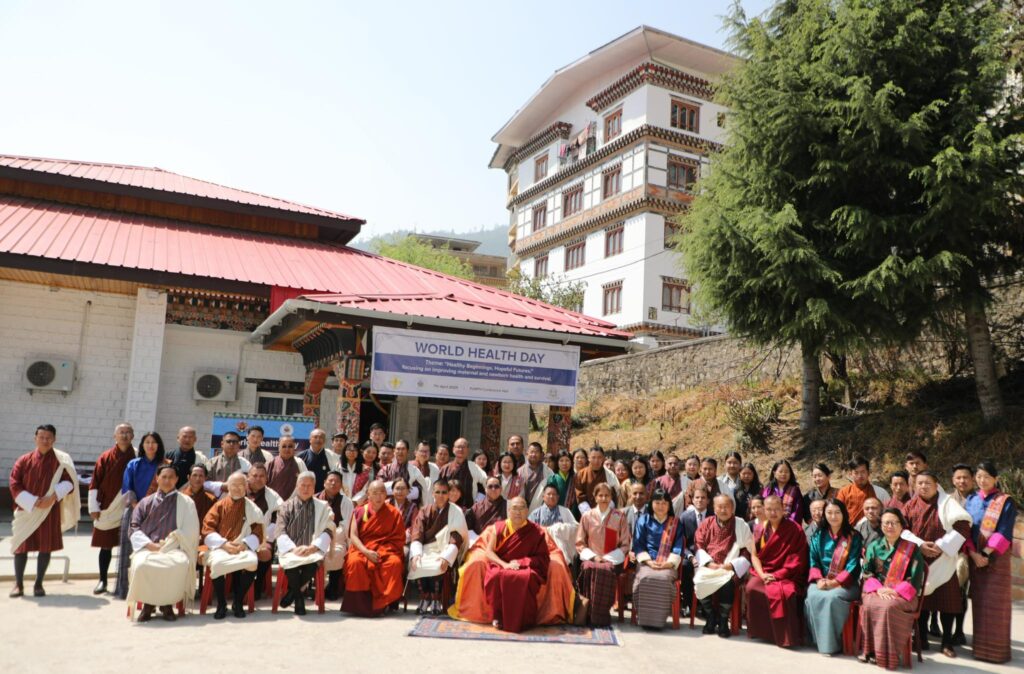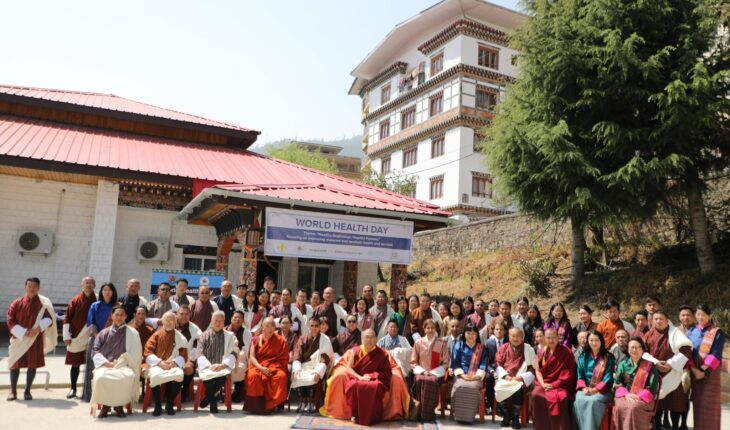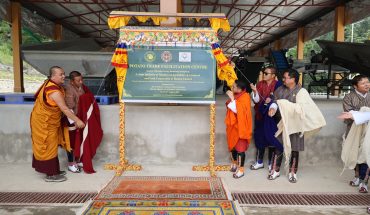
Bhutan observes World Health Day 2025 with renewed focus on maternal and child health, tackling NCDs and health inequities
RENUKA RAI
Thimphu
The World Health Day this year was commemorated with renewed determination to strengthen maternal and child health (MCH) services, combat the escalating burden of non-communicable diseases (NCDs), and address persistent health inequities.
Under the global theme “Healthy Beginnings, Hopeful Futures,” the country reaffirmed its commitment to equitable healthcare for all, particularly for women and children in vulnerable communities.
Organized by the Ministry of Health in partnership with the World Health Organization (WHO), a series of activities took place nationwide, culminating in a central event in the capital city, Thimphu.
A symbolic Nature Health Walk from Changangkha Lhakhang to Kuenselphodrang saw participation from over 80 individuals, including health professionals, civil servants, students, and civil society members.
The walk aimed to promote awareness about lifestyle diseases and encourage a shift toward healthier daily habits through physical activity and connection with nature.
The walk’s message resonated deeply in a country where NCDs—such as cardiovascular disease, diabetes, and chronic respiratory conditions—are on the rise.
The 2024 Annual Health Bulletin revealed a staggering 420,000 cases of NCDs recorded in 2022, emphasizing the urgency of comprehensive prevention and treatment strategies.
Delivering the keynote address, Dr. Bhupinder Kaur Aulakh, WHO Representative to Bhutan, commended the country’s remarkable progress in health over the past decades.
“Bhutan is serving as a leading example of best health care systems, recognized globally. Life expectancy has increased and health services have improved significantly,” she said.
Yet, her praise was tempered by a warning about worrying trends in lifestyle-related health issues. She pointed to increasing alcohol and tobacco use and drew attention to a particularly disturbing statistic.
76 percent of children aged 1 to 6 years in Bhutan have elevated blood lead levels—a public health crisis with long-term neurological and developmental consequences.
Calling for a renewed embrace of traditional Bhutanese food and healthier practices, Dr. Aulakh advocated for dietary habits rooted in indigenous grains like red rice, millet, and buckwheat.
“A balanced diet is essential, and our country’s natural environment offers a perfect setting for healthy lifestyles,” she added.
The event also served as a platform for the Ministry of Health to unveil a range of new initiatives focused on maternal and child health.
Officials also outlined strategies to strengthen healthcare personnel training, reduce the attrition of skilled nurses and doctors, and improve the continuum of care from prenatal to postnatal stages.
“Institutional deliveries have increased, and services for mothers and children now reach even the most remote areas,” said one Ministry official.
Bhutan’s maternal mortality rate has dropped dramatically, from 777 deaths per 100,000 live births in 1984 to just 53 in 2023—a testament to decades of sustained effort.
Dr. Lobzang Dorji, WHO’s focal point for MCH in Bhutan, credited this success to consistent investments in skilled birth attendants, immunization programs, and infrastructure improvements.
Bhutan’s policy of universal health coverage—offering free medical services to all citizens—has also been a cornerstone of its progress, ensuring that economic status does not impede access to essential care.
However, officials cautioned against complacency. “National averages can be misleading,” Dr. Aulakh warned. “We must disaggregate data and address pockets where service coverage remains low.”
She emphasized that indirect causes—such as hypertension and pre-eclampsia, both linked to NCDs—are emerging as significant contributors to maternal deaths.
Teenage pregnancies also remain a persistent concern, with officials calling for more comprehensive reproductive health education in schools and the scaling up of youth-friendly services.
To help Bhutan meet these emerging challenges, the WHO continues to provide extensive technical and strategic support.
This includes training of Bhutanese gynaecologists and nurses in leading regional institutions such as AIIMS in New Delhi, assistance in drafting national maternal and child health strategies, and support for cervical cancer prevention through the HPV vaccination program.
One of the key innovations gaining traction in Bhutan’s health landscape is telemedicine—a solution aimed at narrowing healthcare gaps between rural and urban populations.
WHO is also supporting the institutionalization of maternal and newborn death reviews to ensure that each loss becomes an opportunity for learning and systemic improvement.
Another promising approach is task shifting, where midwives and community health workers are trained to handle broader clinical responsibilities.
“This not only addresses workforce shortages but also ensures timely care at the community level,” said Dr. Aulakh.
Bhutan is also exploring the integration of infertility services into its public health offerings, with a recent study visit to Thailand to assess potential models for adaptation.
Recognizing that health outcomes are shaped by broader social determinants, Bhutan is taking a holistic and multi-sectoral approach.
The Ministry of Health, in collaboration with monastic institutions, is spearheading campaigns against substance abuse. Schools are being transformed into health-promoting environments through yoga, meditation, and physical activity.
Efforts are also underway to integrate mental health, nutrition, and early childhood development into the maternal and child health continuum.
“We must keep building capacity, addressing indirect causes of maternal deaths, and making full use of innovation,” Dr. Aulakh concluded.
“Bhutan has made extraordinary progress, but sustaining these gains and meeting new challenges head-on will define the next chapter.”
His Eminence the Tshoki Lopen Rinpoche who was the chief guest at the celebration, expressed heartfelt gratitude to all health workers serving across the country for their relentless efforts over the years, which have significantly improved maternal and child health outcomes.
He also encouraged health professionals and all those involved in delivering MCH services to continue their dedication and perseverance in this vital work.




